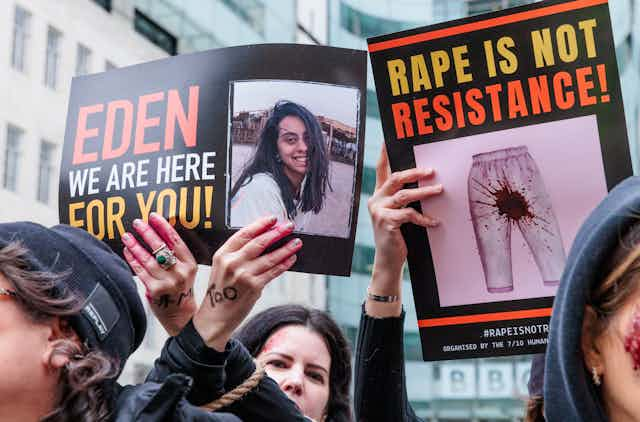Five months after the October 7 attacks, the United Nations has announced it has found reasonable grounds to believe that Hamas fighters and others engaged in the attacks committed crimes of sexual violence including rape, gang rape and other conflict-related sexual crimes.
At the same time, both UN experts and two independent organisations (Addameer – a Palestinian prisoner support and human rights association – and Physicians for Human Rights) claimed that there are credible allegations that Palestinian women and girls were raped while being detained by the Israeli forces.
Sexual violence is an umbrella term covering a range of acts of a sexual nature against women, girls, men and boys. It includes rape, forced marriage, forced prostitution, forced pregnancy, forced abortion and enforced sterilisation. It also covers sexual slavery, trafficking in persons for the purpose of sexual violence or exploitation when committed in situations of conflict.
Sexual violence serves many goals. It dehumanises the civilian populations, humiliates victims and creates fear in local communities where it is committed. Reports show that children born of sexual violence also face significant risks of discrimination. So these crimes have long-lasting effects for the individuals and the communities.
Sexual violence in conflict has gone on as long as humans have waged war. In recent years, sexual crimes have been reported in conflicts in South Sudan, Ethiopia, Democratic Republic of Congo, Haiti, Ukraine and by Islamic State against Yazidi women in Iraq.
For a long time, the UN considered these crimes as an inevitable part of warfare. It wasn’t until the 1990s, after the conflicts in the former Yugoslavia and Rwanda, that the international community condemned the use of sexual violence as a weapon of war.
What international law says
The Geneva conventions and its additional protocols, which regulate the conduct of the parties in an armed conflict, specifically prohibit the use of sexual violence during armed conflict.
Also the Rome statute, which grants the International Criminal Court the power to prosecute international crimes, classifies sexual violence as an offence. It labels it either genocide, crimes against humanity or war crimes, depending on the circumstances.
A number of different tribunals have successfully prosecuted individuals for crimes including sexual violence. These include international bodies set up to investigate specific conflicts, such as the International Criminal Tribunal for Rwanda, which was wound up in 2015 and the trial of Dominic Ongwen, who was fund guilty of, among other offences, rape as a commander in the Lords Resistance Army in Uganda in the 1990s.
Meanwhile, the conviction of Syrian army officer, Anwar Raslan for crimes against humanity, including rape, in a Mannheim court in 2022, set a precedent for domestic courts being able to bring charges for universal jurisdiction laws were applied, which allow courts to prosecute such crimes no matter where they were committed.
But although these crimes are frequently committed during any armed conflict, there have been proportionally very few prosecutions. One of the reasons for the lack of accountability in this field is that investigating sexual violence is a challenging task. Investigating sexual violence in Gaza is no exception.
Why are sex crimes hard to investigate?
There are some videos which appear to show atrocities being committed during the October 7 attack in Israel. But sexual violence is all-too often an unreported and hidden crime. This is why it is so difficult to investigate.

Victims might be reluctant to come forward for several reasons. Some might be too psychologically and emotionally traumatised to tell their stories. This is especially the case during an active conflict where tailored psychological support is unavailable to victims. And victims are also likely to fear the social stigma and the effects associated with sexual violence. For instance, they might be rejected by their own communities.
Individuals who are trying to come to terms with having suffered this sort of trauma are at risk of being retraumatised every time they tell their story. They might be requested to recall those events multiple times in front of investigators, reporters, human rights organisations, prosecutors, defence lawyers and judges.
Professionals interacting with victims of sexual violence should be trained in using a survivor-centred approach, which promotes victims’ emotional and physical safety and establishes a relationship of trust with them. But the reality is that third-party intermediaries used to reach the victims – and even the translators they use – might not have the skills or experience to deal with those delicate topics. So the investigation process can cause further damage.
In addition, the situation in Gaza is still volatile. Reporters and investigators work in a precarious context full of security challenges. It is difficult for the investigators to physically reach the alleged victims when they are alive.
And, given the reality of the situation on the ground, it is likely that a long time will pass between the crimes being committed and forensic investigators being able to access the crimes scenes – especially if victims have been killed and buried. Time is likely to compromise any available evidence.
So, although the UN claims that there are “reasonable grounds to believe” or “credible allegations” that sexual offences have been committed, it is likely that it may take years to identify and prosecute perpetrators. For these judicial proceedings, the burden of proof is higher. Unlike in UN investigations – like the ones that have alleged sexual crimes being committed by both sides – a crime must be proved beyond any reasonable doubt.
In the context of Gaza, the difficulties in investigating sexual violence will make it hard for victims to seek justice and redress. But ensuring accountability for these crimes will be vital to break the cycle of impunity in the interests of reconciliation and a long-term sustainable peace.

